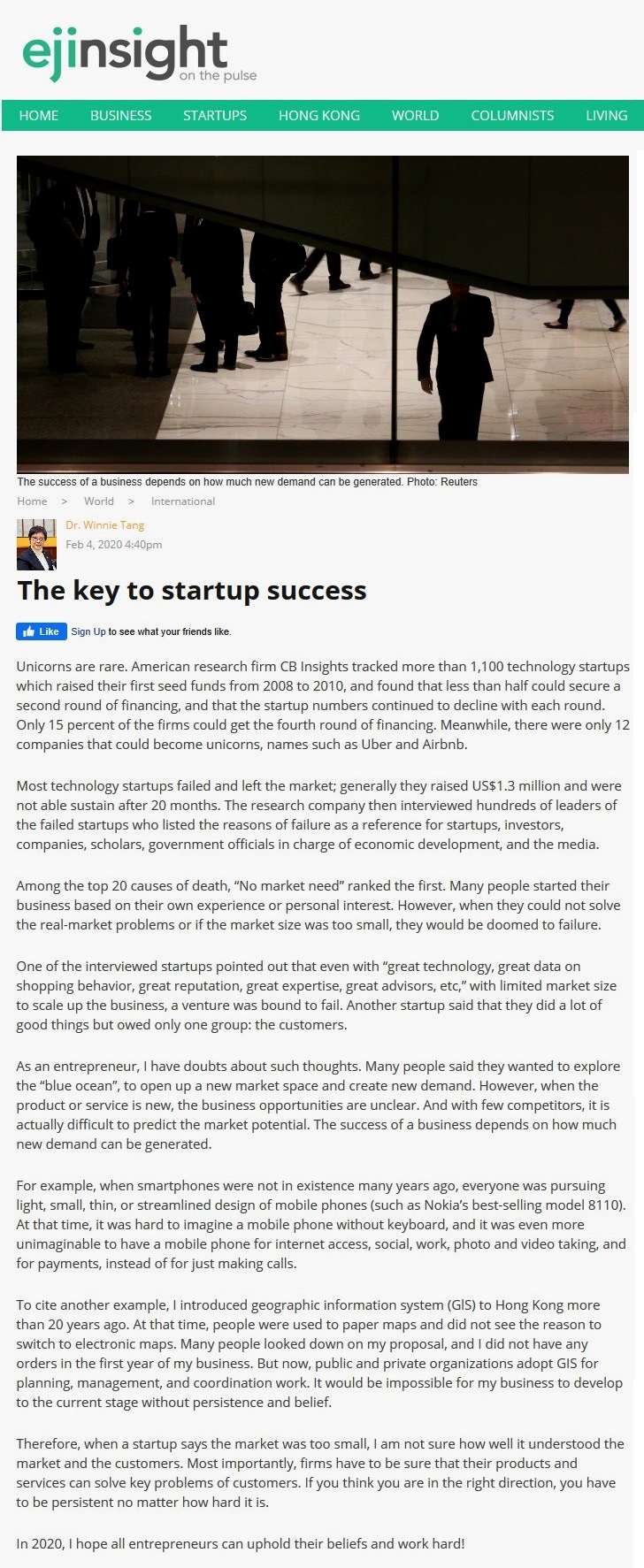網上版請按此

The key to startup success
Unicorns are rare. American research firm CB Insights tracked more than 1,100 technology startups which raised their first seed funds from 2008 to 2010, and found that less than half could secure a second round of financing, and that the startup numbers continued to decline with each round. Only 15 percent of the firms could get the fourth round of financing. Meanwhile, there were only 12 companies that could become unicorns, names such as Uber and Airbnb.
Most technology startups failed and left the market; generally they raised US$1.3 million and were not able sustain after 20 months. The research company then interviewed hundreds of leaders of the failed startups who listed the reasons of failure as a reference for startups, investors, companies, scholars, government officials in charge of economic development, and the media.
Among the top 20 causes of death, "No market need" ranked the first. Many people started their business based on their own experience or personal interest. However, when they could not solve the real-market problems or if the market size was too small, they would be doomed to failure.
One of the interviewed startups pointed out that even with "great technology, great data on shopping behavior, great reputation, great expertise, great advisors, etc," with limited market size to scale up the business, a venture was bound to fail. Another startup said that they did a lot of good things but owed only one group: the customers.
As an entrepreneur, I have doubts about such thoughts. Many people said they wanted to explore the "blue ocean", to open up a new market space and create new demand. However, when the product or service is new, the business opportunities are unclear. And with few competitors, it is actually difficult to predict the market potential. The success of a business depends on how much new demand can be generated.
For example, when smartphones were not in existence many years ago, everyone was pursuing light, small, thin, or streamlined design of mobile phones (such as Nokia's best-selling model 8110). At that time, it was hard to imagine a mobile phone without keyboard, and it was even more unimaginable to have a mobile phone for internet access, social, work, photo and video taking, and for payments, instead of for just making calls.
To cite another example, I introduced geographic information system (GlS) to Hong Kong more than 20 years ago. At that time, people were used to paper maps and did not see the reason to switch to electronic maps. Many people looked down on my proposal, and I did not have any orders in the first year of my business. But now, public and private organizations adopt GIS for planning, management, and coordination work. It would be impossible for my business to develop to the current stage without persistence and belief.
Therefore, when a startup says the market was too small, I am not sure how well it understood the market and the customers. Most importantly, firms have to be sure that their products and services can solve key problems of customers. If you think you are in the right direction, you have to be persistent no matter how hard it is.
In 2020, I hope all entrepreneurs can uphold their beliefs and work hard!
Dr. Winnie Tang
Adjunct Professor, Department of Computer Science, Faculty of Engineering and Faculty of Architecture, The University of Hong Kong